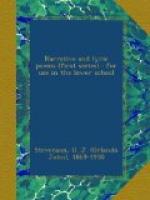[1] Miles Standish was born about 1580, the son of a Lancashire gentleman of a large estate. He entered the army of Queen Elizabeth and served for some time in the Netherlands. There he met the congregation of English Puritans with their pastor, Robinson, and although he did not become a member of their Church, he sailed with them in the Mayflower in 1620. He was entrusted with the defence of the new colony, and held, besides, other offices of trust in the community. In 1830 he removed from Plymouth and settled in Duxbury, where he died in 1656.
[2] The Mayflower, in which the Pilgrim Fathers set sail for America, reached Cape Cod in November, 1620. Some weeks were spent in exploring the coast, but finally, towards the end of December, the Mayflower anchored in Plymouth Harbour, and it was decided that they should make a landing and found a settlement there. The name of “Old Colony” was for a long time applied to the settlement about Plymouth.
[3] doublet. A close-fitting garment for men, covering the body from the neck to the waist.
[4] Cordovan leather. A goatskin leather, prepared in Cordova, Spain.
[5] Cutlass. A short curved sword used by sailors. corselet. Armour for the body; breastplate.
[6] Damascus. A city in Syria, famous for its steel blades.
[7] mystical. Obscure and mysterious in meaning.
[8] fowling-piece. A light gun used for shooting birds. matchlock. An old-fashioned gun, fired by means of a match. This “match” was generally made of twisted cord which would hold the flame.
[9] John Alden had been taken aboard the vessel at Southampton, as a cooper. He was free to return to England on the Mayflower, but decided to share the fortunes of the Puritans.
[10] A monk named Gregory, in the sixth century, seeing some fair-haired youths in the slave market at Rome, enquired as to their nationality. He was told that they were Angles. “Non Angli, sed Angeli,” said Gregory. “They have the faces of Angels, not of Angles.”
[11] Flanders, part of the Netherlands, in Europe.
[12] arcabucero. Literally, archer; here, musketeer,
[13] howitzer. A small cannon.
[14] The following is from an account of Plymouth Colony in 1627: “Upon the hill they have a large square house with a flat roof stayed with oak beams, upon the top of which they have six cannons, commanding the surrounding country. The lower part they use for their Church, where they preach on Sundays and the usual holidays. They assemble by beat of drum, each with his musket or firelock, in front of the Captain’s door; they have their cloaks on and place themselves in order three abreast, and are led by a sergeant without beat of drum. Behind comes the Governor in a long robe; beside him on the right hand comes the preacher, and on the left hand the Captain, and so they march in good order, and each sets his arms down near him. Thus they are constantly on their guard night and day.”




